News from Senator Blakespear
Dear Friend,
It's a wonderful time of year, as the rebirth of spring creates renewed energy. I hope you're getting outside to enjoy the warmth and flowers after such a long, wet winter. I sure am!
A week ago, I was in Chicago, taking advantage of our spring recess with my family. The legislative calendar is essentially a school calendar, and remarkably I had spring break at the same time as our two teenagers.
We seized the opportunity - touring my alma mater Northwestern University with our kids, attending live music and a Broadway theater show, visiting the next-level Lincoln Presidential Library in the state capital of Springfield, Illinois, and learning the history of world-class architecture aboard a Chicago River cruise.
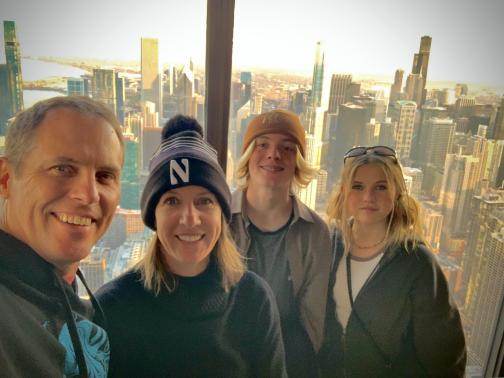
Getting a great view of the city with my husband Jeremy and our two children from 875 North Michigan Avenue, in the building formerly called the John Hancock Center.
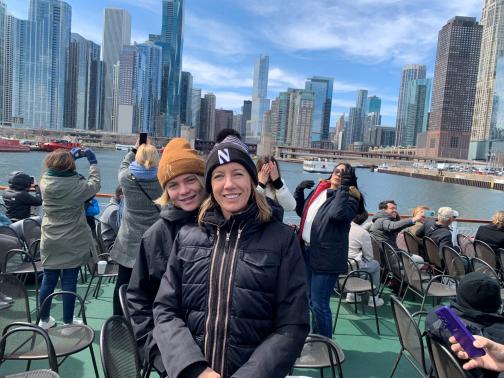
Aboard the Chicago Architecture River Cruise looking back at the city from Lake Michigan.
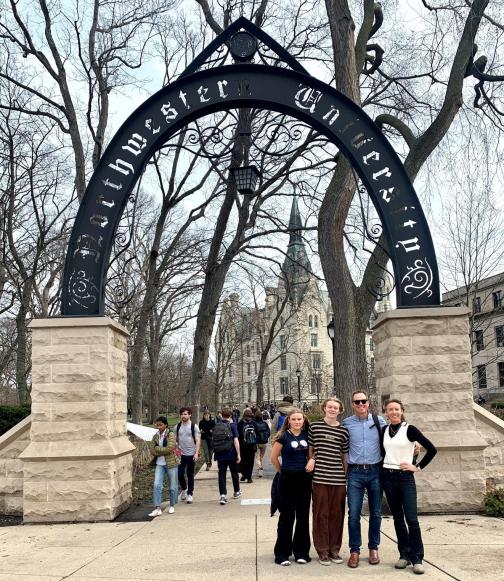
Visiting my alma mater, Northwestern University, where I earned a bachelor's and master's degree in journalism at the Medill School of Journalism.
As we navigated downtown Chicago, I was continually struck by the clean streets and complete absence of tent encampments in public spaces providing housing for homeless people. Homelessness is such an epidemic and a humanitarian disaster in California that its absence in Chicago really struck me.
Chicago is the nation's third-largest city, and the city elected a new mayor while I was there. In addition to my own observation that there was virtually no street homelessness, the local media coverage of the mayor's race didn't mention homelessness at all.
Like all large cities, Chicago has its fair share of people suffering from poverty, mental illness, and drug addiction. But it also has a stagnant or falling population and a relatively large supply of cheap(er) housing. One of the very few unsheltered folks I saw was sitting next to a sign that said he could get a Single Occupancy Room (SOR) for $19. That type of interim, low-cost housing for someone to sleep for a night is increasingly rare in California.
As I work in Sacramento on your behalf to solve problems, it's interesting to witness what other cities are doing and how different their problems are. I firmly believe that homelessness is a structural problem and we can meaningfully reduce it with prioritization and the right approach.
From a book I read recently:
"Until we solve the fundamental problem of political will, resource commitment, and a lack of understanding of the issue as structural in nature, homelessness will persist."
- Homelessness is a Housing Problem: How Structural Factors Explain U.S. Patterns, by Colburn and Aldern, page 168
I wish the state would own the problem of homelessness by directly building homes for people on land owned by the state. If there was adequate housing, local governments could legally prohibit people from living in public spaces, like parks, riverbeds, canyons and downtown streets.
Unfortunately this idea of mine isn't getting traction (yet!). Regardless of what level of government owns the problem of homelessness, we need some level to be tasked with solving it. That's why I've introduced SB 7, which requires cities to plan for homeless housing as part of their legally required housing plans. We will see what happens with this ambitious bill idea.
I am honored to be your state senator and am so energized to work on your behalf!
Thank you for putting your trust in me.
In partnership,

|
There are a lot of bills at the California State Legislature! It's difficult to keep up with them all honestly. I'm grateful to my staff, who helps prioritize and sort through all the different bills that I need to read.
It's important to recognize the tremendous influence that the consultants who work for each committee have on the bills. These legislative staff members, who work for a policy committee and not for any individual, write an analysis of each bill. The impact of their opinions - both for and against a bill - cannot be underestimated. I'm impressed with the diligence, hard work, and research that go into these analyses. It's critical work that grounds every policy hearing.
I am excited and pleased to report that two of my bills passed their first hurdles. SB 428 passed the Senate Judiciary Committee on a 9-0 vote and SB 360 passed the Senate Natural Resources and Water Committee on an 11-0 vote. [Orange County Register: Effort to protect workers from harassment advances]
SB 428 would provide employers with the ability to seek a temporary civil restraining order on behalf of an employee who is being harassed at work by a member of the public. Under current law, it's up to the individual workers themselves to seek such restraining orders, often at their own time and expense, even though the harassment occurs while they are on the job.
This, in my view, is a matter of fairness and protecting employees. Pursuing a restraining order requires time, emotional energy, legal knowledge and resources. Employees should not be forced to do that themselves for protection at work.
SB 360 would broaden the local agencies that a member of the Coastal Commission can jointly serve on to include a Local Agency Formation Commission (LAFCO) or a Joint Powers Authority (JPA).
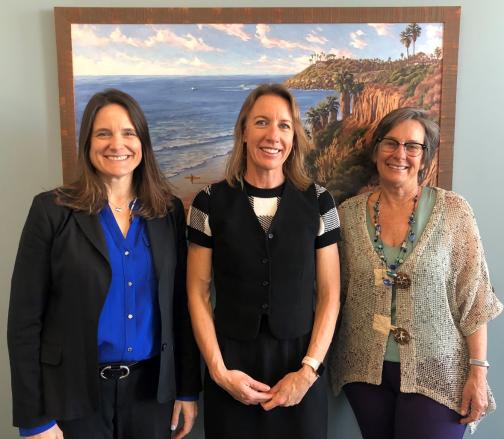
I appreciate the guidance on SB 360 I have received from the Coastal Commission. I met recently with Executive Director Kate Huckelbridge (left) and Legislative Director Sarah Christie (right).
Although members of the Coastal Commission may serve concurrently on other government bodies, such as regional associations of governments, they can't on a LAFCO or JPA. There appears to be no good reason for this prohibition.
With the passage of SB 360, officials who are knowledgeable on coastal issues and local planning issues could serve in both roles. The public would be well served by having representatives with a broad range of municipal experiences.
Additionally, finding officials to serve can be difficult in some counties that have a limited number of officials with the expertise and experience. Currently, a member of a LAFCO or JPA must resign from that position in order to accept an appointment to the Coastal Commission.
|

The Governor and the Legislature received a lot attention for passing legislation to require greater transparency from the oil industry. The Legislature passed SBX1-2 and the Governor signed it in March.
What does it do? It requires oil companies to provide more information about maintenance and pricing decisions and gives the California Energy Commission the staff and authority to monitor the information and charge profit penalties, if necessary.
The legislation sets up a new market monitoring bureau, modeled on the Federal Trade Commission, in the Energy Commission that will watch the industry closely for signs of gas price manipulation.
The Los Angeles Times provided this overview.
I voted for SBX1-2. I am a firm believer in transparency and accountability.
California is a giant market for gas and oil, the same way it is a giant market for cars. Oil companies will not leave the state due to more reporting requirements, the same way automakers did not abandon the state when it required higher emission standards.
The truth is, while Californians were struggling with inflation and paying their bills last year, the oil industry's profits were off the charts. Industry experts couldn't explain the reason for such high gas prices in California. We deserve to know why gas prices skyrocket when they do and to have the ability to do something about it.
|
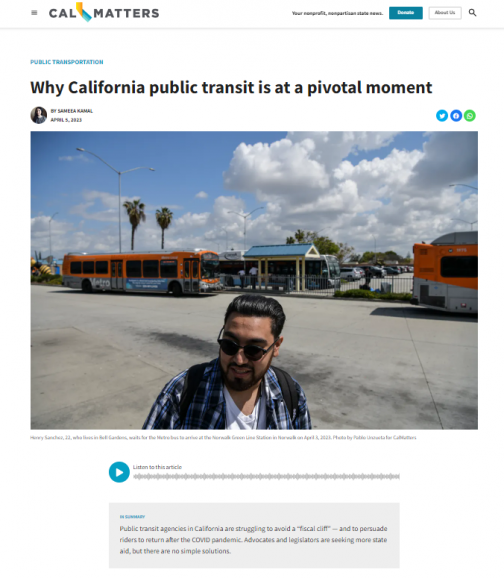
Public transportation agencies are struggling. A recent article in CalMatters explained the many problems they face.
We must address these problems and work to make public transportation viable and desirable - it's key to our climate strategy to dramatically reduce greenhouse gas emissions. But not only that, a well-functioning public transportation system is crucial for a modern society - for the effective movement of people and goods and a strong economy. We need a robust transit system that provides an alternative to driving - future generations depend on us working hard today to make that happen.
I recently sent feedback on the Governor's proposed budget to the Senate's budget committee chair calling for more funding and support for transit. Here is some of what I wrote.
The State Needs to Fund Transit Operations to Encourage Mode Shift, Meet Climate Goals and Provide Transportation for the Lowest Resourced Communities
Unfortunately the Governor's budget proposed cutting $2 billion from public transit capital funding. Transit is foundational for the state's climate strategy and CARB has urged the state to double local transit coverage and service frequencies by 2030. There are record opportunities to access the federal transportation funding coming from the federal Infrastructure Investment and Jobs Act.
The state should do everything possible to capitalize on this once-in-a-generation opportunity to fund capital projects. The goals of that infrastructure bill are aligned with the state's goals around climate, equity, opportunity, access, upward mobility and prosperity. California is pre-positioned through our state's established framework to access this funding. We need to have sufficient local matching funds and staff capacity to get as much federal resource as possible.
It is notable that only 14% of transit is funded by the State of California. We need to invest in our transit systems - both through capital and operations. For some transit agencies, it would be very helpful if the $2 billion allocated for transit in the Governor's budget could be used for operations, not just capital costs.
The operation side of transit is the area that has the largest need given the large amount of federal money that will be available over the next five years for capital projects. Preliminary estimates from the state's transit agencies show operating deficits up to $8 billion over the next 5 years. We do not want to see major service cuts and lack of reliability due to systems in a state of poor repair, and agencies unable to afford to hire needed staff. Transit needs additional state investment, not a reduction in state investment.
|

It's great news that full passenger service along the LOSSAN rail line will resume between San Diego and Orange counties on Monday, April 17.
Service between Irvine and Oceanside was shut down last September, when alarming, erosion-caused track shifts were discovered in San Clemente. Work has been completed to stabilize the tracks.
This article, in the Orange County Register, provides the details. That's not the only positive development. In March, the California Transportation Commission awarded $37 million to the San Diego Association of Governments (SANDAG) for the next stage of work to stabilize the Los Angeles-San Diego-San Luis Obispo (LOSSAN) rail corridor through Del Mar. (See above photo of the railroad tracks proximity to the bluff edge in Del Mar.)
We've seen this past year just how vulnerable this vital rail line is to effects of sea level rise and bluff instability. There is real urgency needed in Del Mar to counter the dangerous erosion of the cliffs beneath the railroad tracks.
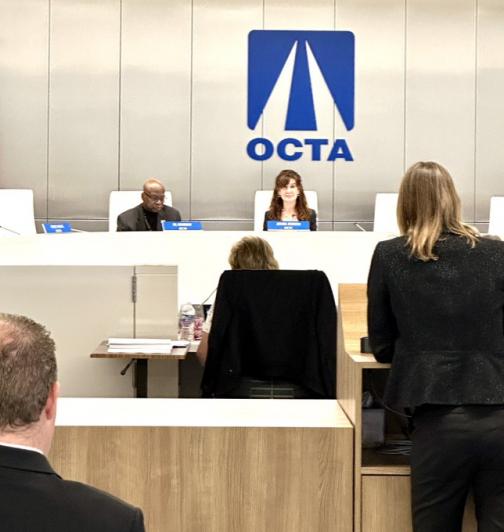
I addressed the LOSSAN Rail Corridor Agency at its March 31 meeting in Orange County. There was a very positive response from all board members.
As the chair of the Senate Transportation Subcommittee on LOSSAN Rail Corridor Resiliency, I look forward to delving deeper into the needs of the entire 351-mile LOSSAN line and determining how the state can best support it. We need to ensure that the second-busiest intercity passenger rail corridor in the nation remains safe, secure, resilient, and economically beneficial for decades to come.
|
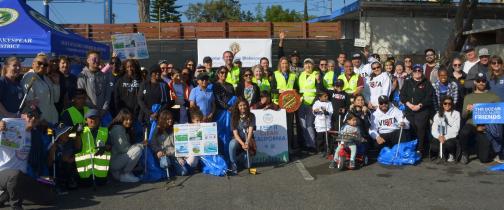
I hosted a cleanup day in the City of Vista on March 26 as part of the Clean California Community Days initiative across the state.
We had an incredible turnout. Collectively, we collected over 425 pounds of trash! I'm so grateful that so many came out to help further beautify the already beautiful downtown Vista. What a wonderful day of community spirit.
We had lots of devoted public officials and organizations help promote this event and join us to make this a big success. Thanks to Vista City Councilmembers Corinna Contreras, Dan O'Donnell and Katie Melendez, and thanks to Caltrans San Diego, the North County Transit District, the City of Vista, the Vista Unified School District, Only Losers Litter, Guerreras en Acción por Un Vista Limpio and all the individuals who came out to join us!
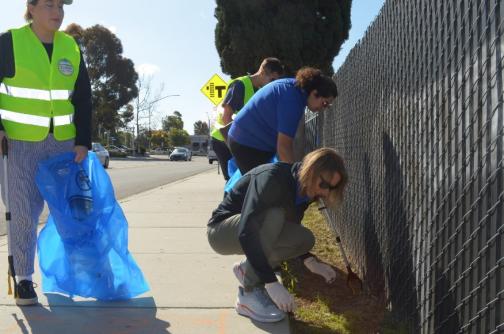
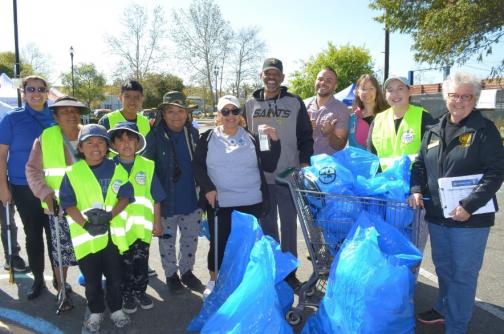
There are more community cleanup events coming up. Don't miss your chance to help out and put into action the pride you take in your community.
Keep Del Mar Green
Hosted by the Del Mar Village Association
3:30-5 p.m., Wednesday, April 19
Del Mar Plaza: 1555 Camino Del Mar, Del Mar, CA 92014
Sign-up link: COMMUNITY CLEANUP - Visit Del Mar Village
Creek to Bay Cleanups
Hosted by I Love a Clean San Diego
9 a.m.-12 p.m., Saturday, April 22
Locations Across San Diego County - the largest cleanup in San Diego County on Earth Day!
Sign-up Link: Creek to Bay | I Love A Clean San Diego (cleansd.org)
|
Earth Day is Saturday, April 22, and the Orange County Transportation Authority (OCTA) is celebrating that by offering free bus rides on that day.
OCTA notes that riding OC Bus is a safe and easy way to get to popular destinations around the county, including bus routes that operate near Downtown Fullerton, Disneyland, Knott's Berry Farm and more. Read more here.
|
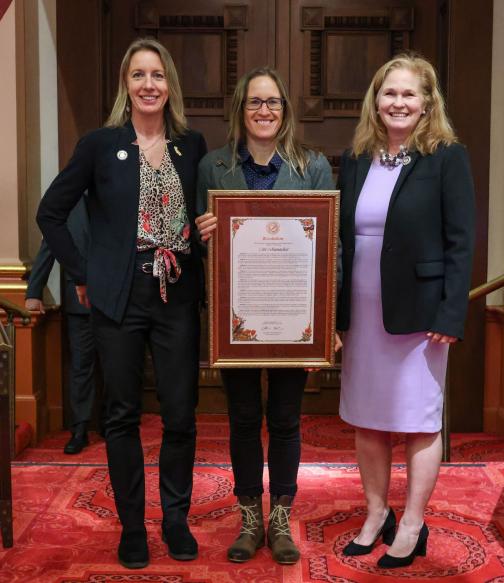
With female surfing champion Cori Schumacher (center) and resolution co-author Assemblymember Gail Pellerin (right), who represents Santa Cruz, another surfing mecca.
I had the great pleasure of introducing, and unanimously passing, a resolution to establish April 8 as Women's Surf Day. Assemblymember Gail Pellerin of Santa Cruz co-authored the resolution and joined me for the presentation.
We also had the honor of recognizing world champion surfer and former Carlsbad City Councilmember Cori Schumacher for her courage and perseverance in advocating for, and advancing, social justice in the world of surfing.
You can watch the presentations below. Click on the images to access the links.
The 38th Senate District includes 56 miles of coastline and therefore lots of surfers and lovers of the water and the beach. The coastline is the wilderness of the district, and surfing is one of the most important ways that residents access, appreciate, love and become life-long protectors of that coastline.
Surfing has been part of California culture - and its lore - for well over a century. In 2018, surfing was designated as California's only official state sport.
Men and women equally love the waves and the ocean.
However, as in many sports, women surfers for a very long time were not accepted as serious athletes. Women often were discouraged from participating and discriminated against, they had less opportunity and encountered many levels of barriers to participate and compete, like exclusion, micro-aggressions, condescension and unwelcome sexualization.
Thankfully, things are changing. Not only are women participating in surfing in greater numbers, but they are getting treated with more fairness and equity at the sport's highest levels.
Today, women make up 35 percent of the nation's 3.4 million surfers and an estimated 100,000 of the West Coast's surfers, according to industry statistics.
Designating Women's Surf Day honors women surfers and the challenges they have overcome to carve out a place for themselves in this sport while celebrating past, present, and future women surfers in their athletic abilities and strengths, and encouraging all women who aspire to, to grab a board, paddle out and ride the waves.
It was my true honor to recognize Cori Schumacher, a world champion surfer, social justice advocate, author, and former Carlsbad City Councilmember. Cori is also the first openly gay world surfing champion. She used her platform to work toward greater justice, diversity, and inclusion in surfing for all women, including women in the LGBTQI+ community and women in the black, indigenous, and people of color community.
Because of her efforts and the efforts of many other women surfers who fought for equality in professional surfing, the World Surf League became the first American sports organization to implement equal pay for male and female athletes in 2019.
Cori is not the only barrier-breaking woman surfer - there have been many who have helped push the boundaries of inclusion and pave the way for others - but she is an impressive, steadfast, resolute, unapologetic champion for women, and for justice and equality.
Cori has served as a role model, not just for her achievements as a professional surfer, but as an activist seeking to make her favorite sport, and the world at large, a better place for all.
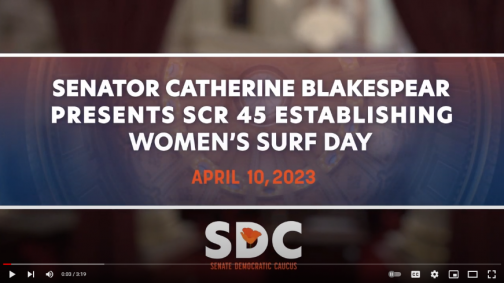
To watch my presentation on SCR 45 establishing Women's Surf Day, click on the image.
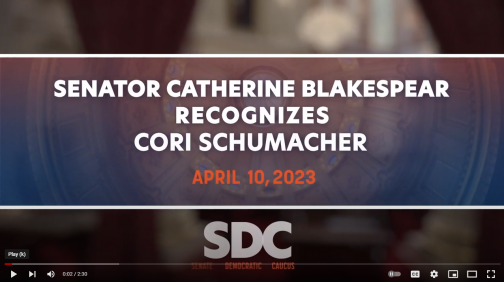
To watch my presentation recognizing Cori Schumacher, click on the image.
|

Turning frowning faces into smiling ones!
Every day, my staff is working to help constituents. Each newsletter, I like to highlight one case, so you can get an idea of what we can do and how we might be able to assist you with any issues you may be having with state agencies.
One constituent who contacted us had been denied his paid family leave due to an administrative error he made. Although his mistake is a common one made by applicants, he was not able to get in touch with anyone at the state Employment Development Department to correct the error.
In frustration, after many weeks of being unable to resolve the matter, he contacted one of my district offices. My district staff was able to connect with EDD, correct the mistake and get the claim approved. The constituent was then issued a check of $7,405, covering his paid family leave to date.
If you have a state government issue that my office can help with, please contact me at Senator.Blakespear@senate.ca.gov.
|
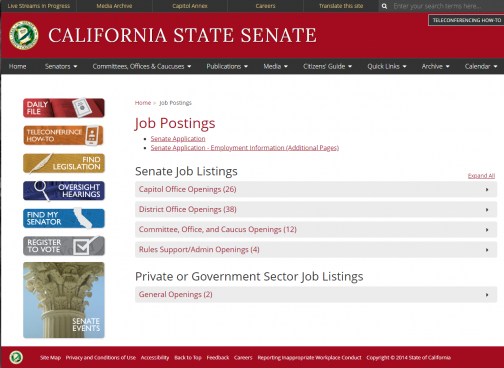
You can find the Senate Application under "Job Postings" on the Senate jobs web page.
We have paid and unpaid summer internships available! We're working on critical legislation to improve California, address issues in our communities, and to meet the needs of all Californians.
We are looking for enthusiastic and motivated individuals. If you are interested in a challenging opportunity in a high energy, team-oriented environment, you are encouraged to apply.
DUTIES:
The District Intern will have as a primary responsibility general office duties, including monitoring and responding to constituent correspondence for the Senator. Interns will support the District Office with community engagement, research, and other projects. Applicants must be organized, detailed, and able to work well with others.
LOCATION AND FILING DATE:
This positions will be located in the Senator's district offices in Encinitas, CA and Laguna Hills, CA. Applications will be accepted until the positions are filled.
SUBMIT COVER LETTER, RESUME, AND SENATE EMPLOYMENT APPLICATION TO:
Fernando Hernandez, District Representative
Office of Senator Blakespear
Email: Fernando.A.Hernandez@sen.ca.gov
Feel free to reach out to Fernando with any questions.
The Senate application form is available through the Senate job webpage: www.senate.ca.gov/senatejobs
|

Malia Cary (left) of the Second Harvest Food Bank of Orange County gave my staff a tour of the organization's Irvine warehouse and operations center on March 28. The food bank provides food to 332,000 individuals each month through a countywide network that includes 285 partners and 310 distribution sites.
The food bank can always use volunteers to help with distribution or to work on its Harvest Solutions Farm. Sign up at Home - Second Harvest Food Bank of Orange County (feedoc.org)
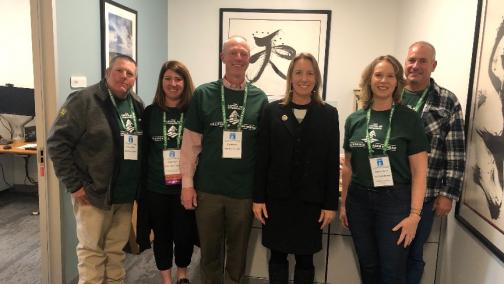
I enjoyed meeting recently with the San Diego Farm Bureau in Sacramento. They are great advocates for San Diego agriculture. We talked about avocados, atmospheric rivers, advertising for the county's farm products and water needs.
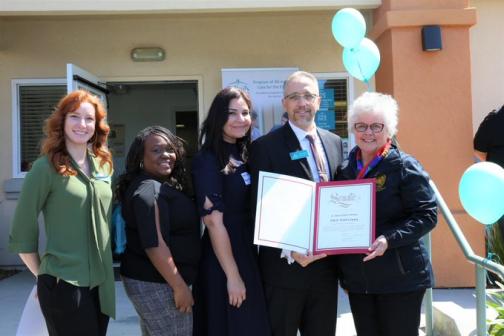
I was so glad my district representative Francine Busby (far right) could join St. Paul's PACE North County to celebrate the grand opening of its newest center in Encinitas! This center provides a comprehensive array of services to enrich and improve the quality of life for the area's seniors.

Photo courtesy of the San Diego Union-Tribune.
Biggest of congratulations to the San Diego State University basketball team for making it the championship game in the Final Four! The buzzer-beating shot that put the Aztecs into the finals was so exhilarating it's almost without words. Watching sports can be such a thrill! I'm so proud of the players.
|

Taxes for 2022 for residents of San Diego and Orange counties are not due until Oct. 16, 2023.
That's because residents and businesses impacted by the 2022-23 winter storms qualify for an extension to that date. Any resident or business that is located within a county currently under a winter storm related disaster declaration, which includes San Diego and Orange counties, qualifies for this deadline extension.
Only residents and businesses in three California counties remain under the original tax deadlines: Lassen, Modoc, and Shasta. Their taxes are due on April 18.
More information is available on the California Franchise Tax Board website.
|
Email my office at Senator.Blakespear@Senate.ca.gov
Call my Encinitas district office at (760) 642-0809
Call my Laguna Hills district office at (949) 598-5850
Call my Capitol office in Sacramento at (916) 651-4038